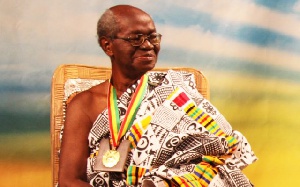World-renowned Ghanaian musicologist and composer Prof. J.H. Kwabena Nketia is 95 years old today. He was born on 22 June 1921 at Mampong, then a little town in the Ashanti Region of Ghana (then known as the Gold Coast).
Professor Nketia received his first musical education, and eventually trained as a teacher at the Presbyterian Training College, Akropong Akwapin, where he later taught and was appointed as Acting Principal in 1952.
At age 23, a very young age to go abroad in those days, Prof. Nketia, through a government scholarship, went to the University of London to study for a certificate of phonetics at the School of Oriental and African studies.
He went on (1949) to Birkeck College, University of London, and Trinity College of Music, London, to obtain his Bachelor of Arts degree. In 1958 went to the U.S.A., where he attended Columbia University, Juliard School of Music, and Northwestern University, to do courses in musicology and composition.
After a year in the United States, he returned to Ghana where he rapidly rose through the ranks at the University of Ghana, Legon – from Senior Research Fellow (1962), to Associate Professor, and finally a full professor in 1963. Two years later, he was appointed Director of the Institute of African Studies.
Prof. Nketia is celebrated all over the world as renowned musicologist and composer. He is to African music what Bartok is to Western music. Of all the interpreters of African music and aesthetics, Prof. Nketia sets the pace, according to africanchorus.org.
His concept and interpretation of time and rhythmic patterns in Ghanaian and other African folk music were revolutionary, and became standard for researchers and scholars around the world. For example, Prof. Nketia introduced the use of the easier-to-read 6/8 time signature in his compositions as an alternative to the use of duple (2/4) time with triplets used earlier by his mentor, Ephraim Amu.
Although this practice undermined Amu’s theory of a constant basic rhythm (or pulse) in African music, and generated some debate, Prof. Nketia maintained that the constant use of triplets in a duple time signature was misleading.
Today, many scholars around the world have found Prof. Nketia’s theory very useful in transcribing African music. Prof. Nketia’s work to reconcile the melodic and rhythmic elements of folk music with contemporary music spurred a new kind of compositional technique for African musicians and academics, worldwide. Other pioneering work include the transcription of many Ghanaian folk songs in a manner virtually free from Western influences.
Prof. Nketia studied with the Rev. Danso, who was a pupil of Ephraim Amu. It is, therefore, no surprise that his earliest choral works were deeply influenced by the pioneering work of Ephraim Amu. Some of his well-known choral works include Adanse Kronkron, Morbid Asem, Monna N’Ase and Monkafo No. Other vocal works with piano accompaniment include Yaanom Montie, Onipa Dasani Nni Aye, Onipa Beyee Bi, Yiadom Heneba, Mekae Na Woantie, Maforo Pata Hunu, Obarima Nifahene and Asuo Meresen.
He also wrote extensively for Western orchestral instruments, like the flute, violin, cello, percussion and piano. But it is through Porf. Nketia’s pace-setting works for traditional African instruments that his genius is acclaimed.
Prof. Nketia wrote for a variety of combinations of modern and local African instruments. Works in this category include the Builsa Work Song (1960), Dagarti Work Song (1961), At the Cross Roads (1961), Owora (1961), Volta Fantasy (1961) and Contemplation (1961).
Prof. Nketia is currently the Director of the International Centre for African Music and Dance (ICAMD), based at the University of Ghana, Legon-Accra, Ghana. He travels extensively, and serves on the advisory panels of many top organisations. He was Professor of Music at UCLA, University of Pittsburgh, and has lectured in many top universities in the US, European, Africa and Asia, including the University of Michigan, Harvard University, Stanford University, Indiana University, City University of London, and the China Conservatory of Music. Professor Nketia, according to africanchorus.org, is easily the most published and best known authority on African music and aesthetics.
At 95, he is still able to walk, talk clearly and still write without aid.
Entertainment of Wednesday, 22 June 2016
Source: classfmonline.com













